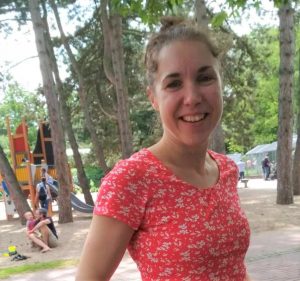
I am a Marie Skłodowska Curie-fellow, sponsored by the European Union to spend two years at the EDRL to carry out my research project SignEd|Math. In this project, I will design and implement a mathematical learning environment that takes into account deaf students’ specific needs while also building on their use of sign language as specific strength and general learning background, influencing what and how they learn. I am excited to work on that with the other members in the lab and interested students at UC Berkeley.
Personal website: Click here for the most updated information about me, my research and my teachings.
Contact: christina.krause at berkeley dot edu (or) christina.krause at uni-due dot de
Background:
After graduating in mathematics, I turned towards mathematics education and finished my PhD in 2015 at the University of Bremen (Germany) with my dissertation “The mathematics in our hands – How gestures contribute to constructing mathematical knowledge”. The following 4 years I spent as a postdoctoral researcher and lecturer at the University of Duisburg-Essen (Germany), interrupted by a half-year stay as a substitute professor at the University of Siegen (Germany). During those 4 years, I got the chance to start my research program DeafMath in which I aim at developing a mathematics education adjusted to the needs and strengths of deaf learners. At the same time, the project seeks to learn from the deaf by getting a new perspective on the learning of mathematics and, and with that, gain deeper insights on what shapes mathematical thinking and learning.
I also took some months off office life on maternity leave that I got to spend with my family in California where I am now happy to live. In my free time I will finally pick up climbing again and keep on getting fascinated by how my little guy makes me re-experience the world.
Research interest
My research focuses on mathematical learning processes, with a special focus on embodiment, gestures and multimodality. Based on this I am interested in how gestures and signs influence the thinking and learning of mathematics. Signs are meant here both in a semiotic and in a linguistic sense. In my PhD project I took a semiotic perspective on processes of constructing mathematical knowledge in social interaction. Ever since then I am fascinated by how gestures are used in mathematical communication and interaction and how they shape how we think about and understand mathematical ideas, both from an individual and from a social perspective.
During that time, I also took courses in German Sign Language to understand better the mechanisms of a manual gestural-somatic language. The question, how learning math in this language influences what and how mathematics is learned came just natural. My entrance point into this research focus – motivational, theoretical and methodological – is hence my study on gestures.
My further research interests, all centralizing in the questions I am interested related to deaf learners, encompass mathematical conceptualization, metaphorics in mathematics, mathematical epistemology, and aspects of language in the learning of mathematics.
Most Recent Publications
Krause, C.M., & Farsani, D. (2021). Gestures and code-switching in mathematics instruction – an exploratory case study. In M. Inprasitha, N. Changsri, & N. Boonsena (Eds.), Proceedings of the 44th Conference of the International Group for the Psychology of Mathematics Education, Vol. 3 (pp. 144-153). PME.
Krause, C. M., Di Martino, P., & Moschkovich, J.N. (2021). Tales from three countries: Reflections during COVID-19 for mathematics education in the future. Educational Studies in Mathematics, special issue ‘Mathematics education in a time of crisis – a viral pandemic’. Online first https://doi.org/10.1007/s10649-021-10066-9
Krause, C.M. & Wille, A. M. (2021). Sign language in light of mathematics education: an exploration within semiotic and embodiment theories of learning mathematics. American Annals of the Deaf, 166(3) (Special issue ‘Critical Topics in Mathematics Education: Research to Practice with Deaf/Hard-of-Hearing Students’), 358–383.
Krause, C. M., & Abrahamson, D. (2020). Modal continuity in Deaf students’ signed mathematical discourse. In A. Isabel Sacristán & J. Carlos Cortés (Eds.), “Entre Culturas / Across Cultures”—Proceedings of the 42nd annual meeting of the North-American chapter of the International Group for the Psychology of Mathematics Education (PME-NA) (pp. 1448–1449). PME-NA. https://doi.org/10.51272/pmena.42.2020-228.
Salle, A.* & Krause, C. M.* (2020). Kognitive Funktionen von Gesten beim mathematischen Arbeiten. Journal für Mathematikdidaktik. Online first: https://link.springer.com/article/10.1007/s13138-020-00169-w (* Shared first-authorship) (Cognitive functions of gestures in mathematical working processes)